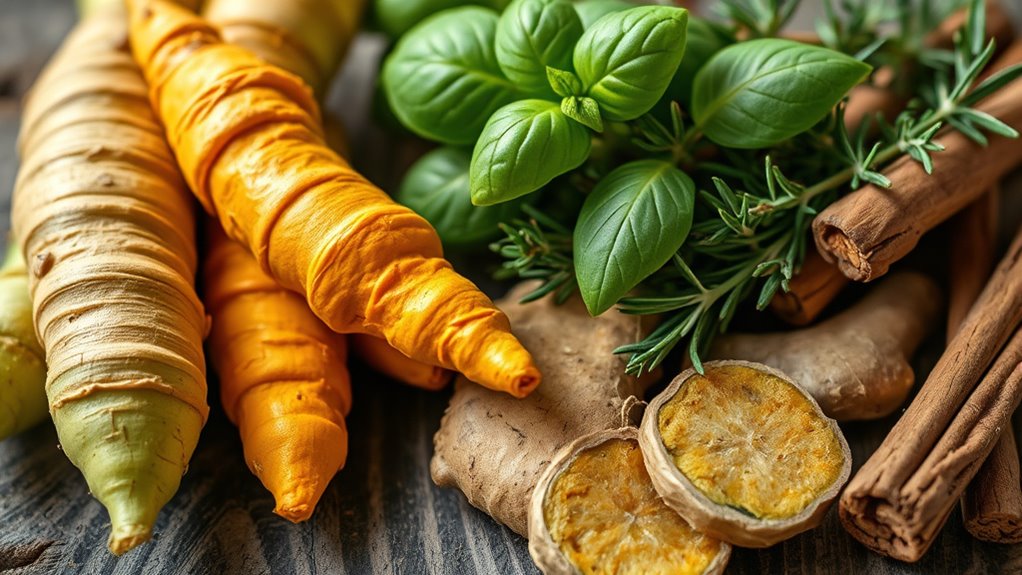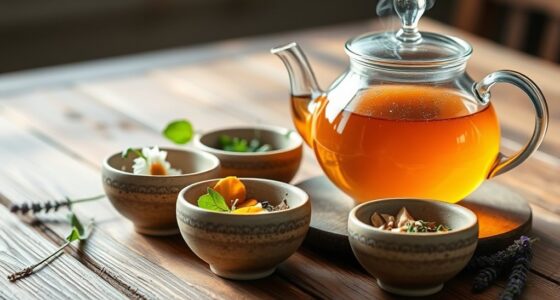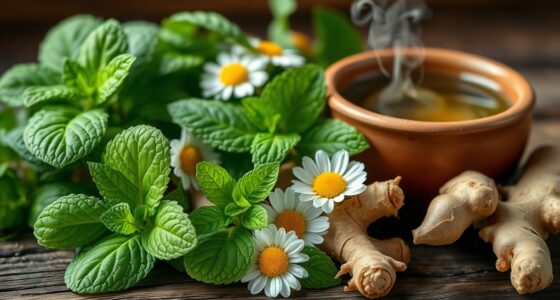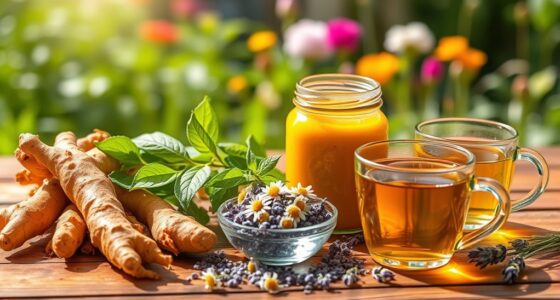Inflammation 101 highlights five top herbs to help reduce chronic inflammation naturally. These include turmeric, which contains curcumin known for its anti-inflammatory effects, ginger with gingerol that eases joint pain, green tea rich in antioxidants called catechins, chamomile for calming effects, and cinnamon, which fights inflammation and supports immune health. Incorporating these herbs into your diet or tea can boost your overall wellness. Keep exploring to discover how to properly use these powerful natural remedies.
Key Takeaways
- Turmeric contains curcumin, a potent compound that reduces inflammation and alleviates joint pain.
- Gingerol in ginger tea has anti-inflammatory effects, helping to ease stiffness and swelling.
- Green tea is rich in catechins, antioxidants that inhibit inflammatory responses.
- Chamomile tea offers calming properties that can soothe inflammation and support immune health.
- Boswellia (frankincense) extracts have been traditionally used to reduce inflammation and improve joint function.
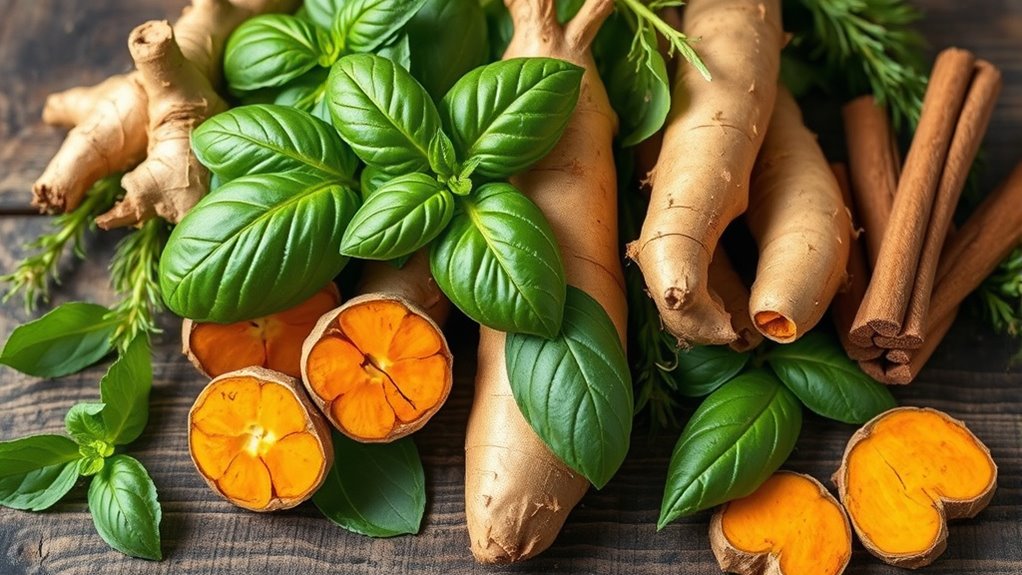
Inflammation is a natural response your body uses to fight off injury and infection, but chronic inflammation can lead to health issues. Fortunately, nature provides some powerful tools to help manage this condition, and herbal remedies are among the most effective. One of the simplest ways to incorporate anti-inflammatory herbs into your routine is through herbal teas. These teas offer numerous benefits, including soothing inflammation and supporting your immune system. Drinking herbal tea benefits go beyond hydration; they can deliver concentrated anti-inflammatory compounds directly to your system. For example, chamomile tea is renowned for its calming effects and can help reduce inflammatory responses. Similarly, ginger tea contains gingerol, a potent anti-inflammatory compound that may help ease joint pain and stiffness. Incorporating these herbal teas into your daily routine can serve as natural remedy tips to combat chronic inflammation.
When considering herbal tea benefits, it’s essential to choose the right herbs. Turmeric, often called the golden spice, can be brewed into a tea that contains curcumin, a compound celebrated for its anti-inflammatory properties. Drinking turmeric tea regularly may help reduce swelling and pain associated with inflammation. Another herb worth mentioning is green tea, rich in antioxidants called catechins, which have been shown to inhibit inflammatory processes. You might find that swapping your usual beverages with these herbal teas not only boosts your health but also provides a comforting ritual that supports your overall well-being. Additionally, understanding how natural materials like herbs interact with your body can enhance the effectiveness of these remedies.
In addition to tea, many herbs can be used as natural remedies in other forms. For example, incorporating turmeric into your cooking is an easy way to benefit from its anti-inflammatory effects. You can also take herbal supplements or tinctures, but always check with a healthcare provider first to guarantee safety and proper dosage. Using herbs as part of your daily routine can be a sustainable approach to managing inflammation, especially when combined with other healthy habits like staying active, eating a balanced diet, and managing stress.
Frequently Asked Questions
Are Anti-Inflammatory Herbs Safe for Everyone?
You might wonder if anti-inflammatory herbs are safe for everyone. While they can be beneficial, you should consider herb interactions and follow dosage guidelines carefully. Some herbs may cause adverse effects or interact with medications, especially if you have existing health conditions or take prescriptions. Always consult with a healthcare provider before adding new herbs to your routine, and stick to recommended dosages to guarantee safety.
How Long Does It Take to See Results?
Did you know that many people start noticing benefits from anti-inflammatory herbs within 1 to 2 weeks? Results depend on factors like herb interactions and adherence to dosage guidelines. Typically, consistent use over this period can reduce inflammation and improve symptoms. Keep track of your progress, and if you don’t see results after a month, consult a healthcare professional to adjust your regimen safely.
Can These Herbs Replace Medication?
You might wonder if these herbs can replace medication, but it’s important to understand herb interactions and dosage guidelines first. While some herbs offer anti-inflammatory benefits, they shouldn’t substitute prescribed medications without consulting your healthcare provider. Use herbs responsibly, follow recommended dosages, and discuss potential interactions with your doctor to guarantee safety. Combining herbs with medications can be beneficial, but professional guidance is essential for effective and safe treatment.
Are There Any Side Effects?
Think of herbs as a double-edged sword—while they can soothe, they might also cause side effects if not used carefully. You should be aware of herb interactions and always follow dosage guidelines to avoid adverse reactions. Some herbs may cause stomach upset or allergic responses. Always consult with a healthcare professional before starting new herbs, especially if you’re on medication, to guarantee safe use and minimize potential side effects.
How Should Herbs Be Properly Prepared and Consumed?
You should focus on proper herb preparation and consumption methods to maximize benefits. Wash herbs thoroughly, and if using fresh, chop or crush them to release active compounds. For teas, steep herbs in hot water for the recommended time. You can also incorporate dried herbs into cooking or take supplements as directed. Always follow dosage guidelines, and consult a healthcare professional if you’re unsure about the best herb preparation methods.
Conclusion
Now that you know these top anti-inflammatory herbs, you can fight inflammation naturally. Think of them as your allies—powerful yet gentle, like a soothing breeze after a storm. Just as a small spark can ignite a fire, small daily choices can spark big health changes. So, choose these herbs wisely, and let their calming effects be your quiet strength. After all, sometimes the simplest remedies bring the greatest relief.

